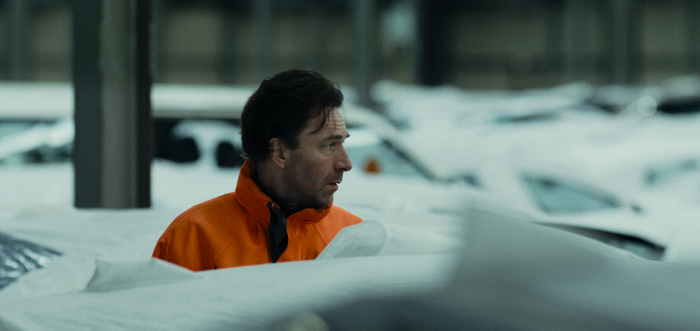
There’s a familiarity to the response of silence that meets the mildly-received speaker who ends a seminar with “any questions?”. It’s unlikely that such a scene will be followed by the speaker denouncing their own work as bad, alienating their publisher to the point of needing a swift career change. The initially nameless protagonist of The Yard (Swedish: Yarden) is defined through these opening scenes; as dejected, bitter, and desperate for employment—a state not unprecedented in Måns Månsson’s work as a director. His works are conceptual and cutting commentaries on the effects of globalisation, the cycles of poverty, and the systems of economic neglect that society creates. At the same time, there’s another layer to Månsson’s style that opts for absurdism and a preference for worst-case scenarios as cases-in-point.
Before the titular yard is even introduced, Månsson’s film is painted with his characteristic veneer of cold irony: our protagonist (Anders Mossling) goes to a job agency titled ‘Dream Job’, winds up at the aforementioned workplace, and is henceforth referred to by his employment number, 11811, for the rest of the film. It’s a particularly cruel opening, but it suits the Kafkaesque series of events that plague 11811 throughout the film. In a sense, these are disastrous, but the word is also too flamboyant for the discreet way that 11811’s soul is battered throughout the film. While this isn’t central to the narrative at hand, it remains a constant throughout the film, allowing Månsson to provoke insights and reflections into the intersections between the working class in Sweden, and immigrants that end up in similar jobs. They share a mutual exploitation, yet continue to conflict with one another, acting as a clear indictment of the rarely seen figures they serve.1
Månsson’s background in cinematography has been pronounced throughout his career, with his camerawork on his previous film, Stranded in Canton, defining it as one of the most visually impressive pieces of that year. While Månsson cedes the position to Ita Zbroniec-Zajt in The Yard, a certain precision remains—it’s likely that Månsson still has a fairly pronounced influence. In particular, there’s a continued contrast between the workers and the cold, industrial world they inhabit: drained-out blues, greys and whites punctuated by the constant presence of hi-vis vests and workwear. Pans through the yard itself sees Månsson and Zbroniec-Zajt obsess over visual homogeneity, with frame after frame placing 11811 as a hi-vis blip amongst rows of cars, buildings, factories, and highways; the fluorescent orange vest as the only thing between 11811 and the overwhelmingly bleak environment Månsson portrays.
Between The Yard and Stranded in Canton, Månsson has expressed himself as a director obsessed with characters affected by globalisation, with the juxtaposing backdrop of industrial, capitalist factories. There’s an obvious shift away from the Guangzhou setting of his previous work, which was also a collaborative piece with Chinese director Li Hongqi, to a more familiar landscape of Sweden, and Månsson operates in a more restrictive set of boundaries here. In the environmental shift, Månsson moves from a global point of intersection to one of initial isolation. At the same time, globalisation finds a new way to manifest itself; in the nature of 11811’s job, one predominantly done by refugees in Sweden.
There’s a greater sense of monotony in The Yard, with a large cast of minor characters putting significant pressure on Anders Mossling’s performance as 11811. There’s no complexity to these figures, which Månsson clearly intends as plot devices and placeholders to accentuate 11811’s isolation. Mossling plays an inversion of the everyman; a figure that is plagued by a lack of malleability in his workplace, his friendships, his family, and the world; something that again, isn’t dissimilar from the protagonist in Stranded in Canton. His only clear route of escaping his cycle lies in the decision to turn in a coworker who earlier in the film turned him in—he bargains with the man who fired him minutes earlier in the film by saying “I know who’s stealing the airbags”, using the knowledge as leverage to get his job back at the clear expense of a colleague. Månsson makes articulate commentary on relationship between the workers and the figures they work for, with the employees only able to move out of their monotonous day-to-day work by trampling one another.
For 11811, the yard is a complex articulation of a variety of fears, failures and fissures; it’s both a physical workplace as well as an emotional landscape where these insecurities are realised. There are clear flaws: it’s over the top at times in its everything-going-wrong teleology, burdened by a poor supporting cast, and bloated by the occasional appeal to cliché as a lazy route to illustrate a point. Yet, like in Stranded in Canton, Månsson’s clear conceptual framework gives his film a buffer that reflects criticisms that might have weighed down a less well made, visually astounding work. While he’s developed a proven formula, The Yard shows that Månsson will have to expand beyond the filmic palette that has served him well in order to move forward as a filmmaker. That said, with a concise runtime of 80 minutes, The Yard is a lean and effective work that sees Mans Månsson continuing to establish himself as one of Sweden’s most cognitive, politically-driven, and conceptually-precise filmmakers.
